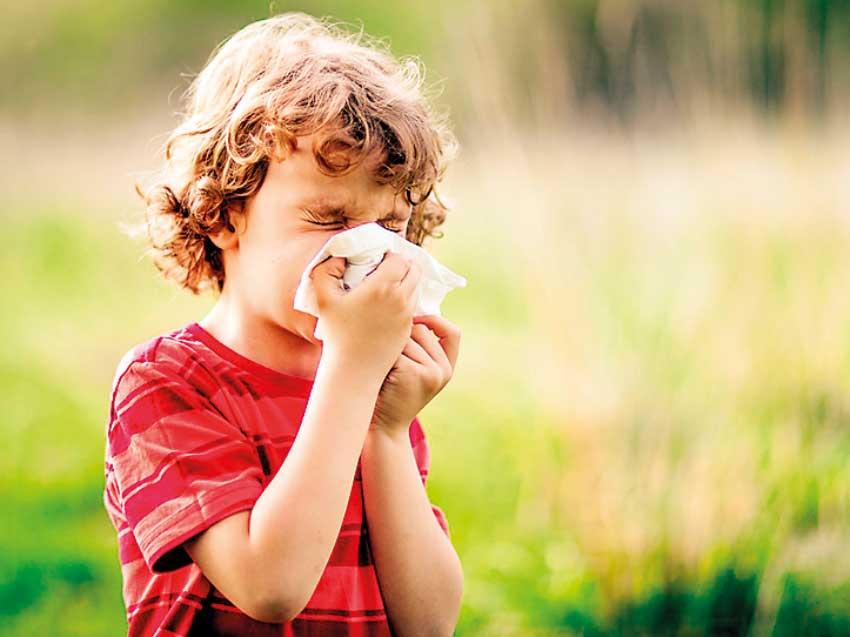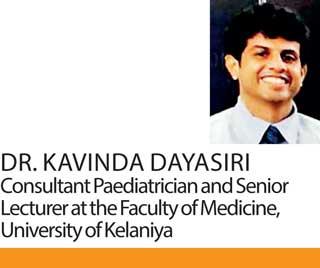13 May 2022 - {{hitsCtrl.values.hits}}

 Hay fever, also known as seasonal allergies, is a condition where a child gets cold like symptoms, which only appear during certain months of the year. When present, it can last several days and cause great distress to a child. What causes this mysterious illness? Is there a cure for it? We consulted Dr. Kavinda Dayasiri, Consultant Paediatrician and Senior Lecturer at the Faculty of Medicine, University of Kelaniya, to get more details on the condition.
Hay fever, also known as seasonal allergies, is a condition where a child gets cold like symptoms, which only appear during certain months of the year. When present, it can last several days and cause great distress to a child. What causes this mysterious illness? Is there a cure for it? We consulted Dr. Kavinda Dayasiri, Consultant Paediatrician and Senior Lecturer at the Faculty of Medicine, University of Kelaniya, to get more details on the condition.
Seasonal allergy
Hay fever is a type of seasonal allergy that occurs in your child following exposure to certain tiny pollens over certain months of the year. The immune systems of children with hay fever treat these pollens as ‘invaders’ and release chemicals called histamine that result in itchy, watery eyes, runny nose and troublesome sneezing. However, determining whether your child is going develop symptoms to one pollen type but not to the other and the severity of the symptoms are highly unpredictable. Hay fever can sometimes occur all year around. In these instances, dust mites, animal hair or dander and mould spores may act as trigger factors for hay fever.
Is it common in children?
Hay fever is common in children and globally, it affects up to 30% of all children. However, the symptoms of hay fever in children can just be put down to common cold as they share certain symptoms such as runny nose and sneezing. This may result in delayed identification and treatment of hay fever in your child.
Clinical presentation
Hay fever presents in children with frequent itchy, watery eyes, runny nose, nasal congestion and sneezing. Sometimes, the child might report of having itchy throat, ears or roof of the mouth. Unlike in viral infections during which the symptoms may last for a few days, children with hay fever have these symptoms for many weeks to months. Hay fever symptoms often vary in severity and symptoms may be worse during some months than others, depending on the presence of allergens and weather conditions. These symptoms can disturb your child’s sleep and can affect schooling due to frequent symptoms that are worse in mornings. Since hay fever is an allergy, the affected children or their family members also can have conditions such as bronchial asthma, eczema and various food allergies.

Treatment
Although hay fever cannot be cured, the symptoms of hay fever can be very well controlled. The best method of controlling symptoms is avoidance of allergens.
Most medicines which are given for hay fever are available as over the counter medications in supermarkets and pharmacies. However, it is always safe to receive advice from your doctor to find out the best medicines for your child. Antihistamines are the most commonly prescribed medications which are administered by mouth. Antihistamines help block the effects of chemicals released during an allergic reaction. Your doctor may prescribe these medications for several weeks to months to cover the whole season during which your child is likely to have most troublesome symptoms. Children with itchy watery eyes and recurrent sneezing also benefit by medications that are administered locally in the form of eyes drops and nasal drops/spray respectively.
While using these medications, it is also important to remember that these medications can sometimes have untoward effects on your child. Some antihistamines can make your child sleepy whilst certain eye drops can cause a burning sensation in your child’s eyes. Although these effects are brief and have no long-term effects, make sure that you seek medical advice to minimise these effects. If the control of symptoms is not optimal despite being on both oral and local medications, the doctor may refer your child to an allergy specialist for allergy testing and escalation of treatment.
Timely treatment is very important since poor control of symptoms can lead to poor quality sleep, tiredness and daytime sleepiness. Further, frequent symptoms can affect your child’s learning performance; increase the chance of sinus and eye infections; and make concurrent asthma control more difficult.
Prevention
One important measure that can control your child’s troublesome hay fever symptoms is allergen avoidance. Most of these allergens are pollens. Pollens are usually more frequent in the presence of sunny, warm and dry weather. Rain washes pollens from the air so the pollen counts are lower on cooler, wet days. It is recommended to keep windows shut at night time to prevent pollens entering indoors. Make sure to wash your child’s hair, face and hands when they come back indoors and also change their clothes. While they play outdoors, children with frequent itchy, watery eyes can wear a pair of wraparound sunglasses to stop pollens entering their eyes. Drying clothes outside can lead to picking up of pollens and therefore, this is best avoided during pollen seasons. Since pollens are mostly found in open fields and grasslands, minimising the time your child play in such places can result in better control of hay fever symptoms. Changing of clothes and having a shower after outdoor play can help managing hay fever symptoms better. It is also recommended to keep windows in your car while driving to prevent contact of your child with pollens. If your child is found to be allergic to animal fur or house dust mites, exposure to these allergens needs to be controlled.
20 Dec 2024 2 hours ago
20 Dec 2024 3 hours ago
20 Dec 2024 4 hours ago
20 Dec 2024 5 hours ago
20 Dec 2024 5 hours ago